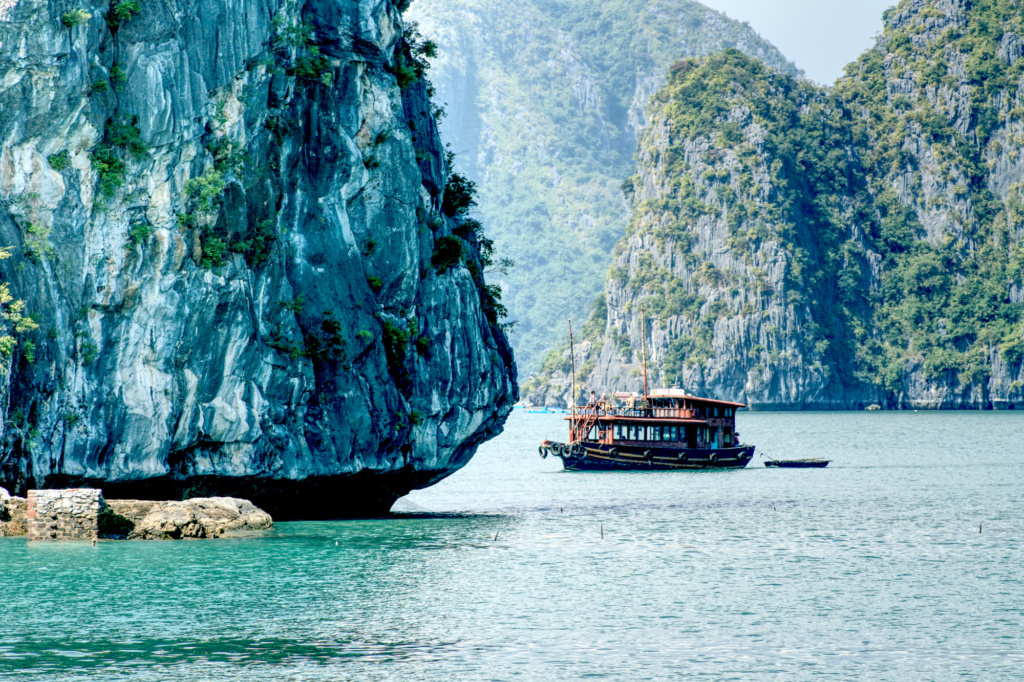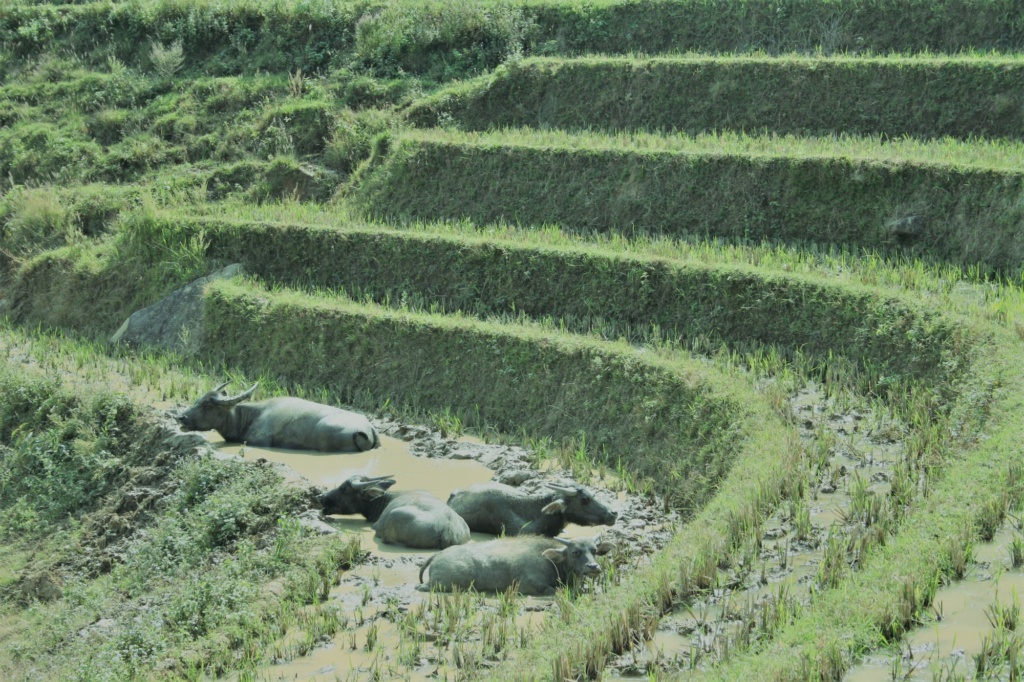VIETNAM
TRAVEL GUIDE
Explore the diverse wonders of Vietnam through our detailed Vietnam travel guide, where ancient traditions blend with modern charm against a backdrop of stunning natural beauty. From bustling cities like Hanoi and Ho Chi Minh City to serene landscapes in Ha Long Bay and the Mekong Delta, Vietnam captivates with its rich history, vibrant cuisine, and warm hospitality. Whether you seek cultural immersion, culinary delights, or adventure, our guide ensures you make the most of your journey through this enchanting Southeast Asian gem.
Vietnam Itineraries
Need to Know
Why Travel to Vietnam
Tip: Vietnam offers vibrant culture, stunning landscapes, and rich history.
Why: From Hanoi’s bustling streets to Halong Bay’s emerald waters, Vietnam blends ancient heritage, natural beauty, and affordable adventures.
How: Explore pagodas, enjoy street food ($1–3), and visit UNESCO sites ($2–10). Book tours via Viator ($15–40) for guided experiences.
Do I Need a Visa
Tip: Most nationalities require a visa, available as an e-Visa ($25) or visa-on-arrival ($25–50) for 30 days. Some countries get 15–45 days visa-free entry.
Why: Ensures smooth entry and compliance with immigration rules.
How: Apply via the Vietnam e-Visa portal ($0). Carry digital copies on Google Drive ($0). Have USD cash for visa-on-arrival fees.
What is the Currency of Vietnam
Tip: The currency is Vietnamese Dong (VND). Expect to spend $15–30/day for budget travel.
Why: Dong is used for most transactions, with USD accepted in some tourist areas.
How: Exchange at banks ($0) or use ATMs ($1–3 fee). Carry small Dong notes (10,000–50,000 VND). Use Revolut ($0 fees) for better rates.
Is Vietnam Cheap to Visit
Tip: Vietnam is very affordable, with meals ($1–3), guesthouses ($5–20/night), and transport ($0.50–5) at low costs.
Why: Budget-friendly options make it ideal for backpackers and cost-conscious travelers.
How: Stay in hostels or guesthouses ($5–20). Eat at street stalls ($1–2). Book via Booking.com ($0) for deals.
Can I Drink the Tap Water
Tip: Avoid drinking tap water; stick to bottled water ($0.50–1).
Why: Tap water may not be safe, risking health issues.
How: Buy bottled water from shops ($0.50–1). Use reusable bottles with filters ($10–20). Check seals on bottles.
Can I Buy a SIM Card
Tip: Purchase a local SIM card for data and calls ($3–10).
Why: Affordable data plans ensure connectivity for navigation and communication.
How: Buy SIMs at airports or local shops ($3–10). Top up via mobile apps ($0). Choose providers like Viettel or Mobifone.
Enchanting Vietnam Travel Guide: Your Gateway to Unforgettable Adventures
Welcome to the Enchanting Vietnam Travel Guide, your essential companion for exploring a land of vibrant culture, stunning landscapes, and rich history. Vietnam captivates with its bustling cities, serene countryside, and UNESCO-listed wonders, from Hanoi’s Old Quarter to the tranquil waters of Halong Bay. This guide covers eight top destinations, cultural experiences, and practical tips to ensure a seamless and unforgettable journey. Whether you’re cruising the Mekong Delta or savoring phở, let this guide inspire your adventure in Vietnam.
How to Get to Vietnam
Travel Options
Tip: Fly into Hanoi (HAN) or Ho Chi Minh City (SGN) ($500–1200 from North America, $100–400 from Europe). Regional airports like Da Nang serve central routes.
Why: Hanoi and Ho Chi Minh City are the main gateways, with connections to regional hubs.
How: Compare flights on Skyscanner ($0). Take buses from Cambodia ($10–20) or Laos ($15–25). Within Vietnam, use trains ($5–20), buses ($3–10), or motorbikes ($5–10/day).
Best Time to Visit Vietnam
Optimal Seasons
Tip: Visit in spring (February–April) or autumn (September–November) for mild weather (20–30°C). Summer (May–August) is hot and humid, while winter (December–January) is cooler in the north.
Why: Spring and autumn offer comfortable weather for exploring cities and countryside.
How: Book accommodations early for peak season ($10–80/night). Pack light clothing and a raincoat. Check forecasts via Weather Underground ($0).
Top Destinations in Vietnam
Hanoi
Tip: Visit Hoan Kiem Lake ($0) and Temple of Literature ($1–2). Explore Old Quarter ($0).
Why: Vietnam’s capital blends historic charm with vibrant street life.
How: Walk or rent bicycles ($2–5/day). Book tours via Viator ($15–30). Wear comfortable shoes for walking.
Ho Chi Minh City
Tip: Visit Notre-Dame Basilica ($0) and Cu Chi Tunnels ($5–10). Explore Ben Thanh Market ($0).
Why: A bustling metropolis with colonial history and modern energy.
How: Use taxis ($2–5) or Grab ($2–5). Book tours via GetYourGuide ($15–30). Dress modestly for sites.
Halong Bay
Tip: Take a cruise ($30–100) and visit Sung Sot Cave ($2–5). Kayak among limestone karsts ($5–10).
Why: A UNESCO-listed bay with emerald waters and dramatic scenery.
How: Take buses from Hanoi ($5–10, 3 hours). Stay on cruises ($30–100/night). Book via Klook ($20–50).
Hoi An
Tip: Explore Ancient Town ($5–7) and visit Japanese Covered Bridge ($0). Enjoy lantern nights ($0).
Why: A UNESCO-listed town with charming streets and vibrant culture.
How: Fly to Da Nang ($20–60) or take buses ($3–7). Stay in guesthouses ($10–30/night). Book via Viator ($15–30).
Hue
Tip: Visit Imperial City ($7–10) and Thien Mu Pagoda ($0). Take a Perfume River cruise ($5–10).
Why: A historic city with royal palaces and serene rivers.
How: Take buses from Hanoi ($10–15, 12 hours). Stay in guesthouses ($10–25/night). Book via GetYourGuide ($10–25).
Sapa
Tip: Trek to Fansipan ($10–20) and visit hill tribe villages ($5–10). Explore Cat Cat Village ($2–3).
Why: A mountainous region with rice terraces and ethnic diversity.
How: Take buses from Hanoi ($10–15, 6 hours). Stay in homestays ($8–20/night). Book via Viator ($15–30).
Mekong Delta
Tip: Take a boat tour in Can Tho ($10–20) and visit Cai Rang Floating Market ($0). Explore orchards ($2–5).
Why: A lush region with vibrant markets and river life.
How: Take buses from Ho Chi Minh City ($3–7, 3 hours). Stay in guesthouses ($8–20/night). Book via Klook ($10–25).
Phu Quoc
Tip: Relax on Sao Beach ($0) and visit fish sauce factories ($0–2). Snorkel in coral reefs ($10–20).
Why: A tropical island with pristine beaches and local culture.
How: Fly from Ho Chi Minh City ($30–70). Stay in resorts ($20–80/night). Book via GetYourGuide ($10–25).
Cultural Experiences and Tips
Vietnamese Cuisine
Tip: Try phở ($1–3) or banh mi ($0.50–2) at street stalls. Enjoy Vietnamese coffee ($1–2).
Why: A flavorful cuisine blending fresh herbs, spices, and rice-based dishes.
How: Dine at Hanoi’s Old Quarter or Ho Chi Minh’s street markets. Book cooking classes via Klook ($15–30). Pair with fresh beer ($0.50–1).
Cultural Festivals and Crafts
Tip: Attend Tet Festival (January–February, $0) or visit silk weaving villages in Hoi An ($5–10).
Why: Festivals and crafts showcase Vietnam’s vibrant traditions and artistry.
How: Check schedules on VietnamTourism.gov.vn ($0). Book craft tours via Viator ($10–25). Bargain respectfully at markets.
Music and Dance
Tip: Enjoy water puppet shows in Hanoi ($5–10) or traditional music performances in Hue ($5–15).
Why: Performances reflect Vietnam’s cultural heritage and storytelling.
How: Book tickets via GetYourGuide ($5–15). Visit venues like Hanoi Water Puppet Theatre. Dress modestly for performances.
Practical Tips for Traveling in Vietnam
Visa and Documentation
Tip: Ensure your passport is valid for 6 months. Most nationalities require an e-Visa ($25) or visa-on-arrival ($25–50); some get 15–45 days visa-free.
Why: Simplifies entry and ensures compliance with Vietnam’s regulations.
How: Use the Vietnam e-Visa portal ($0). Carry digital copies on Google Drive ($0). Have USD cash for visa fees.
Currency and Payments
Tip: Use Vietnamese Dong (VND, $15–30/day). Cards are accepted in cities, but cash is needed for rural areas and markets.
Why: Small vendors and rural areas often require cash payments.
How: Use ATMs in Hanoi ($1–3 fee). Carry small Dong notes (10,000–50,000 VND). Use Revolut ($0 fees) for better rates.
Language and Communication
Tip: Learn phrases like “xin chào” (hello) or “cảm ơn” (thank you). English is limited outside tourist areas.
Why: Basic Vietnamese enhances interactions and shows respect.
How: Use Google Translate ($0) for offline use. Purchase a local SIM card ($3–10) for data.
Safety and Dangers in Vietnam
Tip: Avoid scams in tourist areas like Hanoi. Be cautious of motorbike accidents and pickpocketing in cities.
Why: Petty scams and traffic risks are common in busy tourist hubs.
How: Use a money belt ($10–20). Check travel advisories (US State Department, $0). Drink bottled water ($0.50–1).
More Safety Tips for AsiaAccommodation Options
Tip: Choose hotels in Hanoi ($15–80/night), guesthouses in Hoi An ($10–30/night), or resorts in Phu Quoc ($20–80/night).
Why: Diverse options suit budgets, from urban hotels to beachfront stays.
How: Book via Booking.com or Airbnb ($0). Opt for central locations or scenic guesthouses. Check reviews for authenticity.
Transportation
Tip: Use motorbikes ($5–10/day), buses ($3–10), or Grab ($2–5). Trains ($5–20) are ideal for long distances.
Why: Affordable transport options suit both cities and rural exploration.
How: Use Grab or local taxis ($2–5/ride). Book buses/trains via 12Go.asia ($0). Carry small cash for fares.
Why This Vietnam Travel Guide is Essential
Your Gateway to Unforgettable Adventures
Tip: Use this guide to explore Vietnam’s cultural treasures, stay safe, and immerse in local traditions.
Why: Vietnam’s unique blend of history, nature, and cuisine requires informed planning.
How: Follow tips for Hanoi, Halong Bay, and more. Enjoy phở ($1–3) and water puppet shows ($5–10). Use apps like Grab ($0) for seamless travel.



